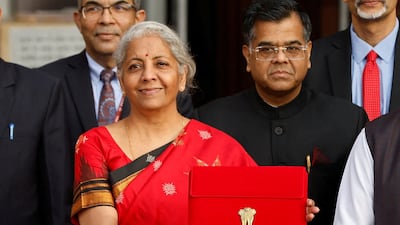The Indian finance minister on Wednesday presented the government's last full budget before the general election in 2024, with a focus on growth and job creation.
“The budget takes the lead, once again, to ramp up the virtuous cycle of investment and job creation,” said Nirmala Sitharaman as she announced that capital spending would be increased by 33 per cent to 10 trillion rupees ($122.19 billion) or 3.3 per cent of gross domestic product in the financial year beginning in April, highlighting infrastructure as a priority.
The increase in capital expenditure “will go a long way in building roads, ports, and airports, which is crucial for making India a reliable investment destination”, said Anand Rathi, the founder and chairman of Anand Rathi Group, a financial services company in Mumbai.
The budget pegged total expenditure to rise by 7.4 per cent to 45 trillion rupees. Its gross market borrowing is projected at 15.43 trillion rupees.
Among the announcements, 350 billion rupees of investment was earmarked for energy security, while agriculture credit was increased, and more money was extended to the country's affordable housing scheme.
The government also unveiled tax reductions for lower and middle income individuals.
The budget's changes to the personal income tax structure are “expected to raise disposable incomes for the middle class .... [and] give a moderate boost to domestic consumption”, said Suman Chowdhury, executive director and chief analytical officer at Acuite Ratings & Research.
While it takes elections into account as Prime Minister Narendra Modi seeks another term next year, the government is also trying to rein in its fiscal deficit in the budget after it spent billions of dollars during the Covid-19 pandemic on vaccines, food for the poor and discounted loans for small businesses.
Ms Sitharaman said she was committed to reducing the fiscal deficit to below 4.5 per cent by the financial year to the end of March 2026.
The deficit ballooned to 9.3 per cent during the financial year to the end of March 2021. But that is projected to have come down to 6.4 per cent in the current fiscal period, and the government is aiming to cut that to 5.9 per cent in the next financial year.
Bonds declined but stock markets in India rallied on Wednesday, with the benchmark S&P BSE Sensex up 1.65 per cent in trading immediately after the budget — although it gave up most of the gains later in the afternoon to trade up about 0.4 per cent. The rupee strengthened, with the US dollar down 0.25 per cent to 81.72 against the rupee.
The budget comes at a time when US-based Hindenburg Research's claims of financial irregularities by the Adani Group are rattling investors. During the budget speech, there were also brief chants of “Adani, Adani” from the opposition benches.
The budget is also being presented against an economic backdrop of high inflation and slowing economic growth.
In her address to parliament on Wednesday, Ms Sitharaman said the economy was on the “right track”.
India, which overtook the UK to become the world's fifth-largest economy last year, is expected to grow by 6.1 per cent this year, surpassing other major economies, the International Monetary Fund said in its latest update this week to its World Economic Outlook.
However, the projection is down from 6.8 per cent for 2022. The IMF forecast that the Indian economy would grow by 6.8 per cent again in 2024, “with resilient domestic demand despite external headwinds”.
India's economic survey, also released on Tuesday, pegged the country's GDP growth at between 6 per cent and 6.8 per cent in the coming financial year, from a projected 7 per cent in the current fiscal year, because weak global economic conditions could affect the country's exports.
“In spite of the massive slowdown globally caused by Covid-19 and the war [in Ukraine], the Indian economy is on the right track,” Ms Sitharaman said during her budget speech.
Inflation in India has been easing as food prices have come down, but it is still very close to the upper threshold that the Reserve Bank of India has set — the target is to keep it between 2 per cent and 6 per cent.
Because of steep inflation, the RBI raised interest rates several times last year.
This has taken a toll, leaving some sectors disappointed that the budget did not deliver more immediate direct benefits.
“The new measures announced in the budget may certainly help unleash Indian economy’s potential,” said Anuj Puri, chairman of property consultancy Anarock.
“However, from a real estate point of view, there were no major direct announcements that could be seen as immediate booster shots.”

